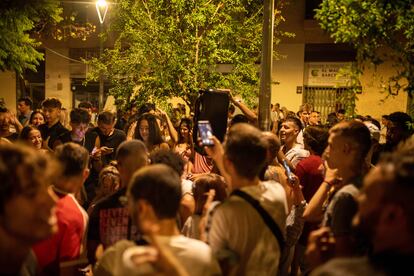Catalan High Court rejects regional government’s latest requests for nighttime curfews
The judges point to the fact that the epidemiological data submitted by the authorities are already out of date, and that police controls should be sufficient to ensure coronavirus rules are respected

The Catalan High Court on Monday rejected the regional government’s plans for a curfew in 43 municipalities, limiting the coronavirus measure to the 19 current areas where it is currently in place. With this latest setback for the region’s authorities, the four provincial capitals in Catalonia – Barcelona, Girona, Lleida, and Tarragona – have escaped a new closure of their nightlife venues.
The regional government wants to impose a curfew in the Catalan municipalities with more than 20,000 residents and where the cumulative incidence of the coronavirus is above 125 cases per 100,000 inhabitants over the previous seven days. On Thursday, the High Court rejected the measure in areas with more than 5,000 residents.
When it filed this latest request, on Friday, the regional authorities presented the same health data that they had on Tuesday, despite the fact that the epidemiological situation had since improved in most of the region, with Barcelona and eight municipalities below the limit established for the application of the nighttime curfew.
In their ruling, the judges pointed to the fact that some of the municipalities with more than 20,000 inhabitants where the curfew had been requested were not exceeding the 125 cases per 100,000 inhabitants, meaning that “according to their own premise the curfew would be even more unnecessary and disproportionate.”
On Monday, 20 of the 62 municipalities where the curfew had been requested had an incidence below 125 cases.
The request filed by the regional authorities pointed to the importance of the closure of nightlife venues in order to “limit” the social interaction that is taking place at night, something that the court in turn decided should be achieved through control of public order. “The control of social interaction is not a health criteria strictly speaking,” the court concluded, adding that police should be deployed to avoid crowds from forming. “For social distancing and mask-use to be respected, the administration has at its disposal measures that are equally effective and less damaging for fundamental rights and public freedoms,” the judges added.
The regional premier, Pere Aragonès, has insisted that his government needs “measures to protect the population,” and responded to the court ruling by saying that the curfew is “not an issue of public order, it’s a health issue.” Speaking while visiting a hospital in Sant Joan Despí, he added: “We need instruments that will avoid new infections.” He also criticized the central government for not having introduced a specific law to give the regions powers to introduce coronavirus measures without having to seek the blessing of the courts.
In the autumn of last year, the central government in Madrid implemented a six-month state of alarm that gave the regions the powers they needed to limit fundamental rights such as freedom of movement in order to curb coronavirus infections without having to seek the blessing of the courts. However, since the state of alarm came to an end earlier this year, judges have to approve measures requested by regional administrations.
The judges on Monday backed the curfew in the following municipalities in Catalonia: Alcarràs (Lleida), Amposta (Tarragona), Arenys de Munt (Barcelona), Badia del Vallès (Barcelona), Balaguer (Lleida), Banyoles (Girona), Calafell (Tarragona), Celrà (Girona), Cervelló (Barcelona), Gelida (Barcelona), Manlleu (Barcelona), Martorell (Barcelona), Montblanc (Tarragona), Móra d’Ebre (Tarragona), Palafolls (Barcelona), Salt (Girona), Sant Feliu de Guíxols (Girona), Sarrià de Ter (Girona) and Torroella de Montgrí (Girona).
Excluded from the list are Barcelona, as well as the main zones in the metropolitan area: Santa Coloma de Gramenet, Badalona, Sant Adrià del Besòs, L’Hospitalet de Llobregat, El Prat de Llobregat, Cornellà de Llobregat, Esplugues de Llobregat, Sant Andreu de la Barca and Sant Boi de Llobregat.
English version by Simon Hunter.
Tu suscripción se está usando en otro dispositivo
¿Quieres añadir otro usuario a tu suscripción?
Si continúas leyendo en este dispositivo, no se podrá leer en el otro.
FlechaTu suscripción se está usando en otro dispositivo y solo puedes acceder a EL PAÍS desde un dispositivo a la vez.
Si quieres compartir tu cuenta, cambia tu suscripción a la modalidad Premium, así podrás añadir otro usuario. Cada uno accederá con su propia cuenta de email, lo que os permitirá personalizar vuestra experiencia en EL PAÍS.
¿Tienes una suscripción de empresa? Accede aquí para contratar más cuentas.
En el caso de no saber quién está usando tu cuenta, te recomendamos cambiar tu contraseña aquí.
Si decides continuar compartiendo tu cuenta, este mensaje se mostrará en tu dispositivo y en el de la otra persona que está usando tu cuenta de forma indefinida, afectando a tu experiencia de lectura. Puedes consultar aquí los términos y condiciones de la suscripción digital.









































